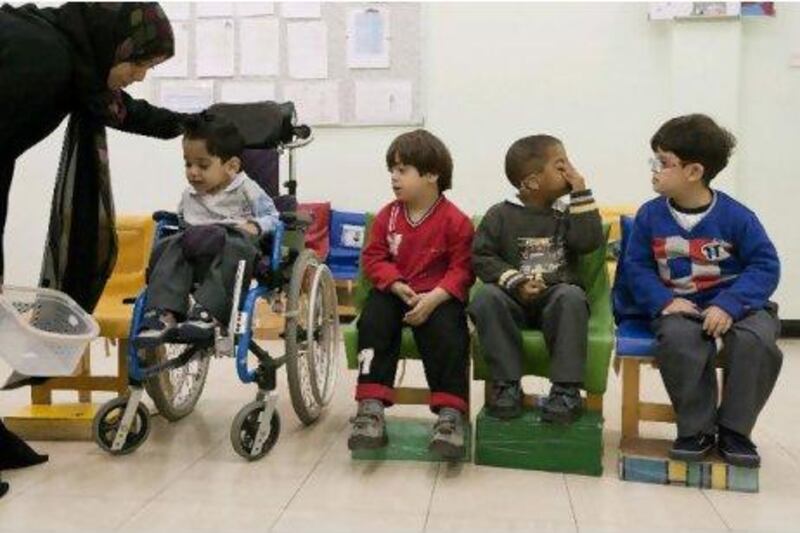ABU DHABI // The lead researcher of a project that introduces students to their special-needs peers has revealed that some schools do not want to participate and do not see the point of integration.
The Emirates Foundation-funded project that used interviews and workshops to analyse the attitudes of more than 6,000 Emirati students from 70 public schools over two years found widespread inaccurate perceptions about people with intellectual disabilities.
Dr Eman Gaad, the dean of the faculty of education at the British University in Dubai and the lead researcher on the two-year project, said she faced reluctance from some schools to even conduct the workshops, because they "did not see the need for them".
"It is the mentality of people towards those with intellectual disabilities," Dr Gaad said. "Many think those with disabilities will not be able to succeed in life.
"There is a social stigma and a glass ceiling associated with intellectual disabilities, and our workshops aimed to eradicate that."
About 65 per cent of the students she interviewed between the ages of 13 and 18 believed people with intellectual disabilities needed constant medical care, and 47 per cent believed they were mentally ill.
Dr Gaad said she also found very few people knew about the UAE law that protected the rights of people with intellectual or physical disabilities. "Even if they do, they do not think it is mandatory," she said.
Under the law, the state guarantees any person with special needs an equal chance at an education in all educational institutions.
Since the passing of the Disability Act in 2006, education officials have made moves to encourage the integration of disabled students into mainstream schools.
The Abu Dhabi Education Council has overseen the integration of more than 4,000 students with intellectual and physical disabilities into mainstream schools since 2009.
But progress has been slow.
Wael Allam, the technical director at the Early Intervention Centre at the Sharjah City for Humanitarian Services, said few children from the centre had been integrated into mainstream schools.
"It is difficult because there are no trained teachers or professional services within the schools," he said. "However, we try to conduct regular awareness sessions at schools so that they can open up to the idea of inclusion."
Hassan Saleh, a high school student at a public school in Ajman, said many students were unkind to children with intellectual disabilities in his school. "They do not appreciate them and make fun of them."
He said there was only a handful of children with disabilities in his school, "but these students are not provided the proper support". He added: "It is better they go somewhere where they are treated properly." That is a perception that Dr Gaad has tried to change.
After interviewing students, Dr Gaad introduced them to their peers from the UAE Down syndrome Association. "People fear the unknown and when the students saw these children in the flesh, talking about their disability, it really helped them change that rigid mindset."
A 13-year-old boy from Abu Dhabi, who was surveyed before and after the workshop said: "I know now that they can talk - a bit fuzzy, but they are happy and friendly."
Another student from Ajman said she was initially afraid of them. "We have someone with intellectual disability in our community but I never bothered to talk to him. Now I will," she said.
After the workshop, 53 per cent of pupils could differentiate between intellectual disabilities and mental illness - an increase of six percentage points.






